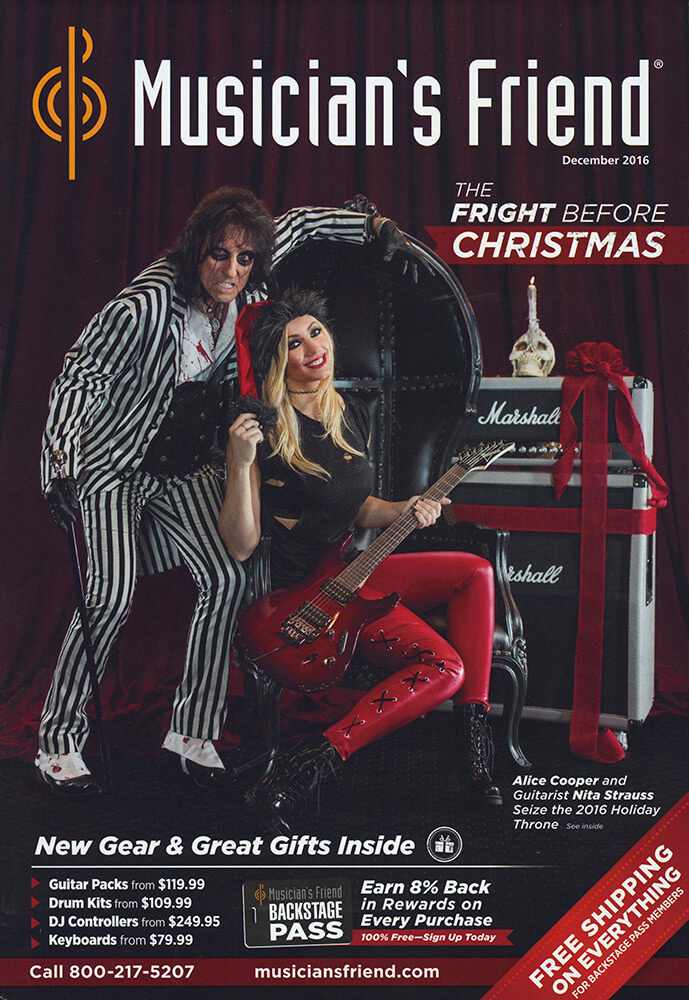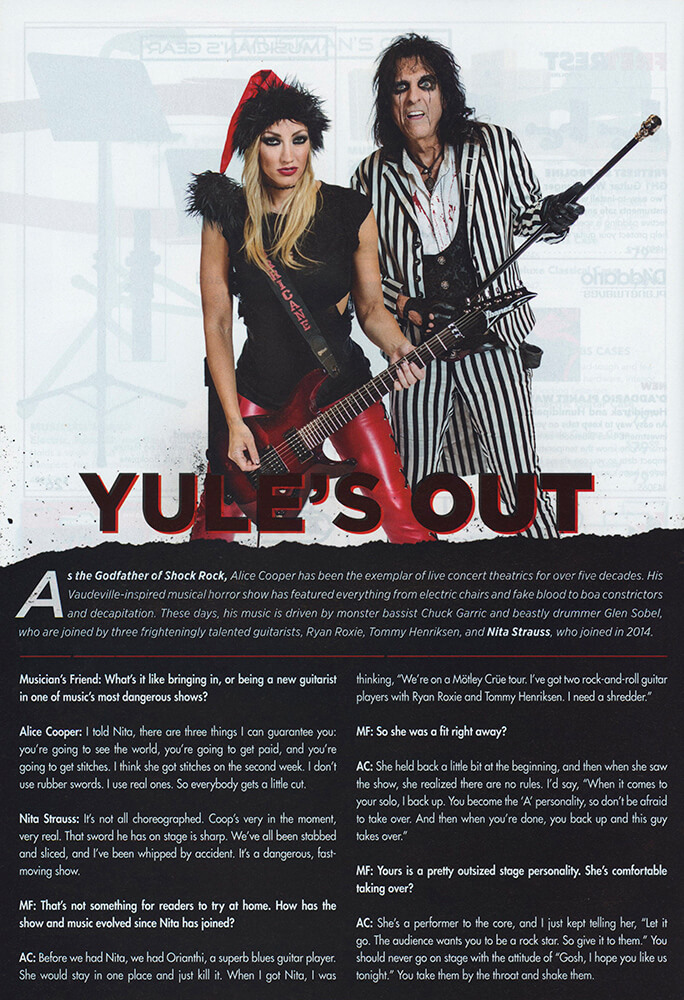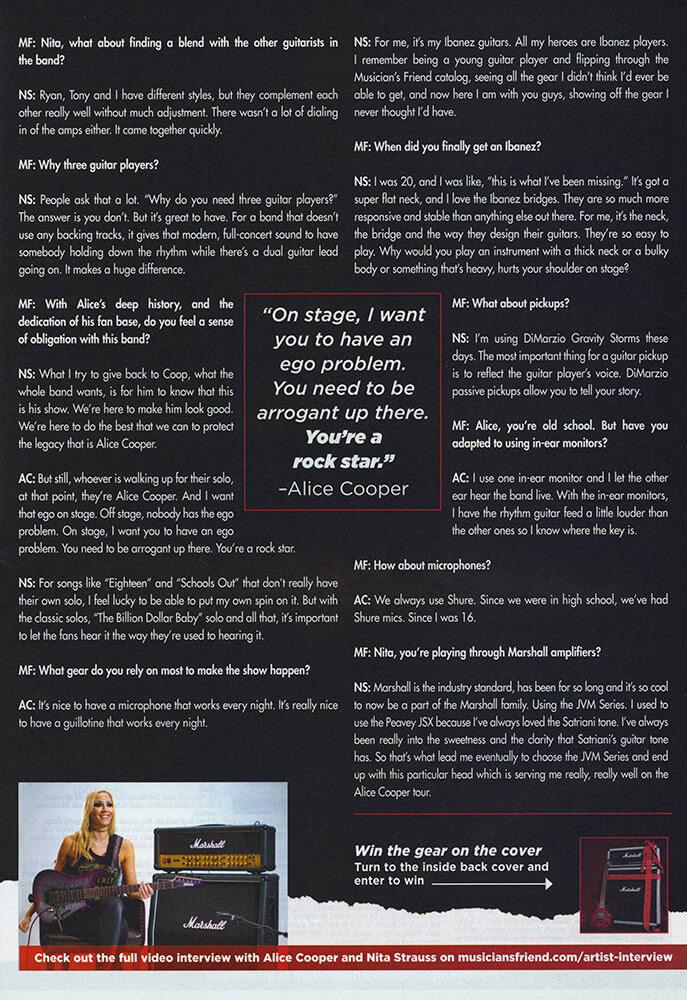Article Database

Musician's Friend
December 2016
Yule's Out
As the Godfather of Shock Rock, Alice Cooper has been the exemplar of live concert theatrics for over five decades. His Vaudeville-inspired musical horror show has featured everything form electric chairs and fake blood to boa constrictors and decapitation. These days, his music is driven by monster bassist Chuck Garric and beastly drummer Glen Sobel, who are joined by three frighteningly talented guitarists, Ryan Roxie, Tommy Henriksen, and Nita Strauss, who joined in 2014.
Musician's Friend: What's it like bringing in, or being a new guitarist in one of music's most dangerous shows?
Alice Cooper: I told Nita, there are three things I can guarantee you: you're going to see the world, you're going to get paid, and you're going to get stitches. I think she got stitches on the second week. I don't use rubber swords. I use real ones. So everybody gets a little cut.
Nita Strauss: It's not all choreographed. Coop's very in the moment, very real. That sword he has on stage is sharp. We've all been stabbed and sliced, and I've been whipped by accident. It's a dangerous, fast-moving show.
MF: That's not something for readers to try at home. How has the show and music evolved since Nita has joined?
AC: Before we had Nita, we had Orianthi, a superb blues guitar player. She would stay in one place and just kill it. When I got Nita, I was thinking, "We're on a Motley Crue tour. I've got two rock-and-roll guitar players with Ryan Roxi and Tommy Henriksen. I need a shredder."
:MF: So she was a fir right away?
AC: She held back a little bit at the beginning, and then when she saw the show, she realized there are no rules. I'd say, "When it comes to your solo, I back up. You became the 'A' personality, so don't be afraid to take over. And then when you're done, you back up and this guy takes over."
MF: Yours is a pretty outsized stage personality. She's comfortable taking over?
AC: She's a performer to the core, and I just kept telling her, "Let it go. The audience wants you to be a rock star. So git it to them." You should never go on stage with the attitude of "Gosh, I hope you like us tonight." You take them by the throat and shake them.
MF: Nita, what about finding a blend with the other guitarists in the band?
NS: Ryan, Tommy and I have different styles, but they complement each other really well without much adjustment. There wasn't a lot of dialing in of amps either. It came together quickly.
MF: Why three guitar players?
NS: People ask that a lot. "Why do you need three guitar players?" The answer is you don't. But it's great to have. For a band that doesn't use any backing tracks, it gives that modern, full-concert sound to have somebody holding down the rhythm while there's a dual guitar lead going on. It makes a huge difference.
MF: With Alice's deep history, and the dedication of his fan base, do you feel a sense of obligation with this band?
NS: What I try to give back to Coop, what the whole band wants, is for him to know that this is his show. We're here to make him look good. We're here to do that best that we can to protect the legacy that is Alice Cooper.
AC: But still, whoever is walking up for their solo, at that point, they're Alice Cooper. And I want that ego on stage. Off stage, nobody has the ego problem. On stage, I want you to have an ego problem. You need to be arrogant up there. You're a rock star.
NS: For songs like "Eighteen" and "School's Out" that don't really have their own solo, I feel lucky to be able to put my own spin on it. But with the classic solos, the "Billion Dollar Babies" solo and all that, it's important to let the fans hear it the way they're used to hearing it.
MF: What gear to you rely on most to make the show happen
AC: It's nice to have a microphone that works every night. It's really nice to have a guillotine that works every night.
NS: For me, it's my Ibanez guitars. All my heroes are Ibanez players. I remember being a young guitar player and flipping through the Musician's Friend catalog, seeing all the gear I didn't think I'd ever be able to get, and now here I am with you guys, showing off the gear I never thought I'd have.
MF: When did you finally get an Ibanez?
NS: I was 20, and I was like, "this is what I've been missing." It's got a super flat neck, and I love the Ibanez bridges. They are so much more responsive and stable than anything else out there. For me, it's the neck, the bridge and the way they design their guitars. They're so easy to play. Why would you play an instrument with a thick neck or a bulky body or something that's heavy, hurts your shoulder on stage?
MF: What about pickups?
NS: I'm using DiMarzio Gravity Storms these days. The most important thing for a guitar pickup is to reflect the guitar player's voice. DiMarzio passive pickups allow you to tell your story.
MF: Alice, you're old school. But you adapted to using in-ear monitors?
AC: I use one in-ear monitor and I let the other ear hear the band live. With the in-ear monitors, I have the rhythm guitar feed a little louder than the other ones so I know where the key is.
MF: How about microphones?
AC: We always use Shure. Since we were in high school, we've had Shure mics. Since I was 16.
MF: Nita, you're playing through Marshall amplifiers?
NS: Marshall is the industry standard, has been for so long and it's so cool to now be part of the Marshall family. Using my JVM Series, I used to use Peavey JSX because I've always loved the Satriani tone. I've always been really into the sweetness and the clarity that Satriani's guitar tone has. So that's what led me eventually to choose the JVM Series and end up with this particular head which is serving me really, really well on the Alice Cooper tour.
(From the collection of Anders Mossberg)





